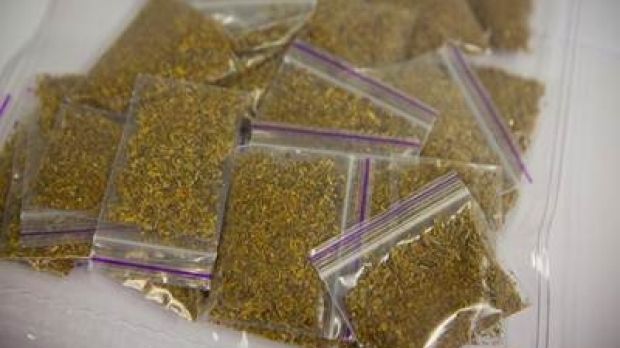
Some of the synthetic drugs seized by police in Belconnen on Friday. Photo: ACT Policing
ACT police have seized more than $25,000 of synthetic cannabis from a tobacconist in Belconnen with medical experts warning an “evolutionary cat-and-mouse battle” has created new drugs and a more resilient market.
On Friday afternoon, detectives from ACT Policing’s drugs and organised crime team seized 69 bags of synthetic drugs from a retail store after receiving a tip-off from members of the public.
The raid comes just days after two Queensland men aged 33 and 41 died from suspected synthetic cannabis poisoning in Mackay, causing ACT medical authorities to fear similar drugs may be available in Canberra.

‘These substances are evolving faster than the legislation designed to control them’: Dr David Caldicott. Photo: Melissa Adams
Dr David Caldicott, an emergency department consultant at the Calvary Hospital, said the use of synthetic drugs was worrying and placed additional stress on staff who already have to deal with intoxicated patients.
“I really want to know what killed those two men in Queensland because we have contact with the drug consuming community and we really need to let them know there is a problem drug to be wary of,” he said.
“The reason these new drugs are here is because we bred the market to have them and we have never had less control over the market than we do now.
“These substances are evolving faster than the legislation designed to control them, and are a cause of considerable concern to doctors who are tasked with treating them.”
In 2014, police seized more than 520 various brands and sized packets of synthetic cannabis executed on three retail outlets in Canberra.
In December, ACT Policing seized 285 1.5-gram packets of synthetic cannabis during a raid on the Butts N Brew store in Calwell, which is not affiliated with a store of the same name in Kaleen.
Dr Caldicott said it was very difficult to determine the products involved in the death of the two men in Queensland, but it was important to do so through meticulous investigation.
“The rate of evolution of these drugs … in general is such that many have never been seen before,” he said.
“Even if a drug has been previously identified and characterised, the way that the body metabolises it could make it undetectable by routine urinary drug screening.
“This situation is analogous to the crime committed by a perpetrator whose fingerprints are not on record – if analysts are uncertain of what they are looking for, the product might never be found.”
The seizure of synthetic drugs comes after the ACT Government introduced reforms to clarify drug laws and make it easier to identify and target drug dealers in the territory.
The reforms made new types of synthetic drugs, such as synthetic cannabinoids, stimulants and hallucinogens such as Kronic, Bath Salts and N-Bomb controlled drugs.
But Dr Caldicott said more radical reforms would be needed to respond to a “tectonic shift in the drug market as the best responses in Australia have so far been borderline idiotic and profoundly dumb”.
“The drugs market in Australia is currently in the middle of an evolutionary cat-and-mouse battle, with out-dated approaches forcing not just the emergence of new drugs, but an entirely new market, a market immune to the more traditional techniques of interdiction,” he said.
“We need wittier and wiser responses to the problem of harm from drugs, if these deaths are not to become a more frequent occurrence in a generation of young Australians.”
According to ACT Policing, the sale of synthetic drugs could result in up to five years imprisonment or fines of up to $55,000 or $275,000 for businesses, despite many Canberrans being confused by the legality of the drugs.
“With their colourful packaging and availability to be purchased in stores they can often be mistaken for something that is legal and safe to use, however these substances are often labelled ‘not for human consumption’,” a spokesman said.
“If business owners are unsure of the content of their products then they need to consider removing them from their store completely or seek advice from the Therapeutic Goods Administration.
“Often the ingredients in synthetic drugs are unknown and their effects on a person’s body and mind can be very dangerous”.
Professor Jan Copeland is the Director of the National Cannabis Prevention and Information Centre, said the two deaths were a stark reminder of the risks these drugs pose.
“What is marketed as synthetic cannabis is essentially unspecified organic plant material that has been sprayed with chemicals and is then smoked in order to produce a feeling of being ‘high’,” she said.
“There have been numerous reports of emergency department presentations with adverse cardiovascular effects such as high blood pressure and racing heart; seizures; kidney failure and severe mental health effects such as hallucinations, psychosis, panic and anxiety.”
